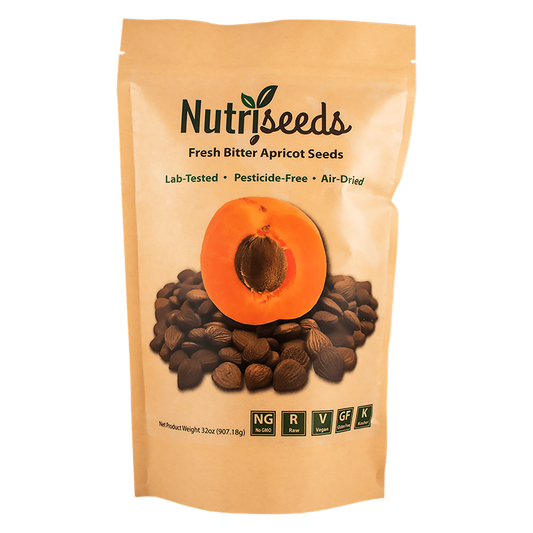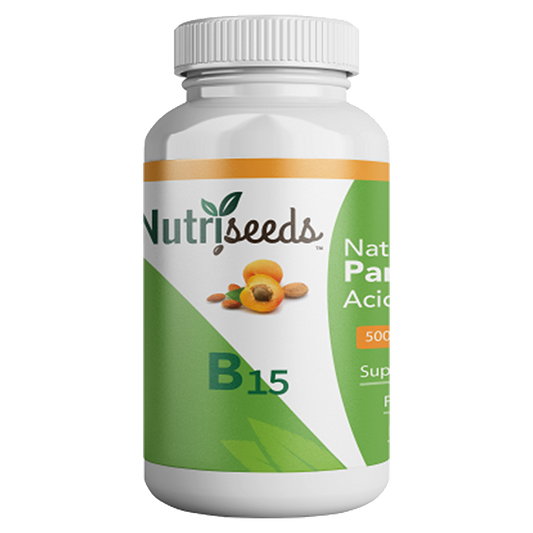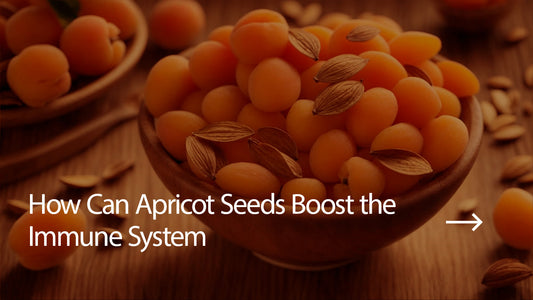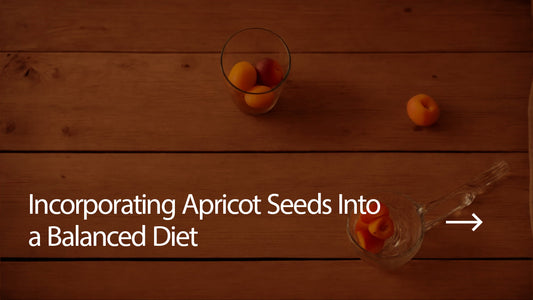
Exploring the Energy-Boosting Potential of Apricot Seeds
Table of Contents
- Discovering Nutrients in Apricot Seeds That Boost Energy
- Identifying Key Vitamins in Apricot Seeds
- Importance of Minerals Found in Apricot Seeds for Energy
- Uncovering the Role of Protein in Energy Enhancement
- The Link Between Healthy Fats in Seeds and Sustained Energy
- The Science Behind Apricot Seeds and Increased Stamina
- Exploring How Apricot Seeds Improve Metabolic Rates
- Studies on Apricot Seeds Related to Endurance Enhancement
- How Apricot Seeds Contribute to Better Physical Performance
- Apricot Seeds: A Source of Natural Energy for Athletes
- Analyzing Apricot Seed Intake in Sports Nutrition
- Benefits of Apricot Seeds for Muscle Recovery
- The Role of Apricot Seeds in Pre-Workout Regimes
- Comparing Apricot Seeds With Other Natural Energy Foods
- Nutritional Comparison With Other Natural Energy Sources
- Taste and Convenience in Energy Boosting Diets\D
- Long-Term Health Benefits of Choosing Apricot Seeds
- How to Incorporate Apricot Seeds Into Your Daily Diet
- Easy Recipes for Breakfast That Include Apricot Seeds
- Snack Ideas With Apricot Seeds for a Midday Energy Boost
- Smoothies and Shakes That Blend Apricot Seeds Effectively
- Navigating the Controversy: Safety of Apricot Seed Consumption
- Understanding the Concerns About Amygdalin in Apricot Seeds
- Research on Safe Intake Levels of Apricot Seeds
- Debunking Myths Associated With Apricot Seed Toxicity
- Nutritional Profile of Apricot Seeds
- Possible Mechanisms for Energy-Boosting Effects
- Current Research on Apricot Seeds and Energy
- Potential Side Effects and Safety Concerns
- Dosage Recommendations
- The Holistic Approach: Apricot Seeds in Traditional Medicines
- Historical Uses of Apricot Seeds in Natural Therapy
- Modern Adaptations of Traditional Recipes for Energy
- Integrating Apricot Seeds With Other Holistic Health Practices
- Personalized Nutrition: Tailoring Apricot Seed Intake to Your Needs
- Assessing Individual Energy Needs for Optimal Apricot Seed Consumption
- Creating a Personalized Apricot Seed Diet Plan
- Monitoring the Effects of Apricot Seeds on Personal Energy Levels
- Maximizing Absorption: Best Practices for Eating Apricot Seeds
- Effective Methods to Prepare and Consume Apricot Seeds
- Combining Apricot Seeds With Other Foods for Enhanced Absorption
- Optimal Times of Day to Consume Apricot Seeds for Energy
- From Seed to Energy: The Journey of Apricot Seed Digestion
- Tracing the Digestive Process of Apricot Seeds
- How the Body Converts Apricot Seed Nutrients Into Energy
- The Impact of Digestion on the Energy-Boosting Properties of Apricot Seeds
- Potential Heart Health Benefits
- Frequently Asked Questions
- Can apricot seeds really boost energy levels?
- Are apricot seeds safe to consume on a daily basis?
- How do apricot seeds compare to other natural energy foods?
- What are some ways to incorporate apricot seeds into my diet?
- Is there any scientific evidence to support the energy-boosting effects of apricot seeds?
- Conclusion
Amidst the constant quest for natural energy boosters, apricot seeds emerge as a compelling source, tinged with a blend of intrigue and ancient wisdom.
Embedded within the hardy kernels of Prunus armeniaca lies a trove of nutrients, including essential fatty acids and vitamins, that could potentially elevate energy levels and enhance stamina.
Yet, as athletes and health enthusiasts are starting to take note, there's a delicate balance to strike—navigating between the nutritional benefits and the concerns over cyanide compounds found naturally in these seeds.
In this explorative journey, we'll uncover how apricot seeds might contribute to increased vitality while ensuring safe consumption practices.
Keep reading to learn how incorporating these little powerhouses into your diet may help keep your energy sustained throughout your most demanding days.
Discovering Nutrients in Apricot Seeds That Boost Energy

Embarking on my latest educational journey, I've become intrigued by the often-overlooked apricot kernel's potential energy-boosting properties.
Typical discussions around prunus armeniaca, the Latin for apricot, might center on its deliciously sweet fruit, but lurking within the hard shell of its seed lies a wealth of nutrients.
As I delve into the composition of these kernels, my attention is drawn to the key vitamins housed within, each acting as a spark plug for energizing the body.
Beyond the vitamins, the treasure trove of vital minerals present signifies their irreplaceable role in maintaining our energy levels.
Essential proteins found in seeds enhance energy in ways not universally understood, striking my curiosity to uncover more.
Moreover, the healthy fats nestled in these seeds don’t just offer sustained energy but potentially influence our metabolism.
My exploration of apricot seeds unfolds the fabric of these energizing elements, underscoring the indispensable part they play in the tapestry of our overall well-being.
Identifying Key Vitamins in Apricot Seeds
My research into apricot seeds reveals a veritable symphony of vitamins, with B17 striking a unique chord. Also known as amygdalin, this compound found in the kernels shows promise as a potent energy source, which has fueled my interest in its metabolism within the body.
Focusing on the fat-soluble vitamins, specifically vitamin E, I've learned it plays an instrumental role as an antioxidant. This nutrient, abundant in apricot kernels, is crucial for warding off cellular damage caused by oxidative stress, thereby supporting energy production and overall vitality.
Importance of Minerals Found in Apricot Seeds for Energy
My research deepened when I turned my focus to the minerals in apricot seeds, realizing their pivotal role in the energy story of our bodies. Iron, present in these kernels, is a cornerstone for producing hemoglobin, which is essential for transporting the oxygen that fuels our cells and energizes our daily activities.
Zinc, another mineral I found in apricot seeds, is a catalyst for numerous enzymes involved in energy metabolism. This crucial mineral affects protein synthesis and helps our body maintain a robust and efficient energy production system, lending credence to the idea of apricot seeds as an energy enhancer.
Uncovering the Role of Protein in Energy Enhancement
Proteins in apricot seeds intrigued me as a critical element for boosting energy because of their role in sustaining cellular structures and facilitating metabolic reactions. The proteins act as building blocks for enzymes that accelerate biochemical processes, thus offering a stable supply of vigor to meet the demands of our active lives.
I discovered that these proteins, specifically in apricot kernels, help repair tissue and contribute to the synthesis of hormones and enzymes vital for producing energy. Their ability to support muscle function and prevent fatigue makes them an essential ally in my ongoing quest for natural energy solutions.
The Link Between Healthy Fats in Seeds and Sustained Energy
Investigating the fats found in apricot seeds, I was taken aback by the predominance of unsaturated fatty acids, such as oleic and linoleic acid. These healthy fats make a significant contribution to sustained energy by supporting cardiovascular health, which is fundamental for efficient blood flow and thus, energy distribution.
It's fascinating how these lipids work in harmonious concert with other nutrients to slow digestion, providing a longer-lasting energy release. This vital characteristic highlights a relationship between the consumption of apricot kernels and a more consistent energy buoyancy throughout the day.
The Science Behind Apricot Seeds and Increased Stamina

My journey dissecting the health benefits of apricot seeds has brought me to a fascinating intersection where ancient wisdom meets modern science
As a fervent believer in the synergy between diet and vitality, I am drawn to the energy-boosting potential these kernels may harbor.
It's an area ripe with opportunity for discovery, touching upon how these small yet potent seeds might enhance metabolic rates, contribute to greater physical endurance, and ultimately, lead to improved physical performance.
This exploration is not just about uncovering the benefits but also understanding the underlying mechanisms that could transform our approach to natural health augmentation.
Exploring How Apricot Seeds Improve Metabolic Rates
Enthralled by the intricate dance of molecular biology, my work peered into the metabolic influence of apricot kernel consumption. The discovery of fatty acids such as oleic and linoleic acid, as part of the nutrient-dense profile of these seeds, suggests their critical role in optimizing metabolism, possibly enhancing energy utilization in the body.
Interest piqued by promising data, I investigated how the fiber content in apricot seeds might affect metabolic rates, pondering the role of this dietary fiber in slowing glucose absorption. This mechanism could stabilize blood sugar levels, providing a more moderated release of energy, and I hypothesize could deter spikes and crashes that impact metabolic steadiness.
Studies on Apricot Seeds Related to Endurance Enhancement
Immersing myself in the latest studies, I've encountered promising research that examines the endurance-enhancing attributes of apricot seeds. Scientists are especially interested in how their bioactive compounds, such as amygdalin, affect endurance by potentially reducing fatigue and improving recovery times after vigorous exercise.
The data emerging from these studies, while still in preliminary stages, suggest that the antioxidant profile of apricot kernels might contribute to mitigating oxidative stress during physical exertion. This could lead to a direct boost in stamina, suggesting that these seeds may hold untapped potential for athletes or anyone seeking to enhance their physical performance.
How Apricot Seeds Contribute to Better Physical Performance
My passion for research and nutrition often propels me to seek out unique avenues for enhancing physical performance. Apricot seeds, or the kernels within prunus armeniaca, have become a focal point of this quest, primarily due to their phytochemical profile, which includes amygdalin, a compound known to influence vitality.
Their dense concentration of essential nutrients, extending beyond amygdalin to include vitamins and fatty acids, emerges as a pillar in dietary strategies aimed at improving athletic prowess. Evidence suggests that the consumption of these potent kernels may optimize energy utilization, thus potentially fortifying one's physical capabilities and endurance.
Apricot Seeds: A Source of Natural Energy for Athletes

As an avid proponent of integrating natural elements into fitness regimes, I'm continually captivated by the prospect of harnessing the latent energy within apricot seeds to empower athletes.
In exploring their place within sports nutrition, I unearth impressive prospects for not only amplifying endurance but also accelerating muscle recovery.
My intrigue builds around their inclusion in pre-workout routines, where these robust kernels might expand the frontiers of athletic performance through a burst of natural, nutrient-rich energy.
It's a topic I approach with a scientific curiosity, eager to discern the truth behind their potential as a powerhouse snack for the physically active.
Analyzing Apricot Seed Intake in Sports Nutrition
Exploring the intersection of apricot seed intake and sports nutrition, I've become increasingly aware of their potential benefits for athletes. Through careful examination of their nutritional profile, I've hypothesized that these kernels may significantly impact the efficacy of workout regimes, potentially offering a strategic advantage for sustained energy and performance.
My analysis involves cross-referencing the nutritional data of apricot seeds with the requirements of athletes during intense training. Paying close attention to their metabolic needs, I aim to uncover how the oleic and linoleic acid-rich content can impact endurance and muscle recovery, revealing the practicality of incorporating these seeds into an athlete's diet.
Benefits of Apricot Seeds for Muscle Recovery
My fascination with the curative aspects of various foods led me to consider the fatty acids in apricot seeds as potential aids in muscle recovery. The presence of oleic and linoleic acid within these kernels aligns with my understanding of their anti-inflammatory effects, which could be pivotal in reducing the muscle soreness athletes often experience post-exercise.
In the midst of evaluating apricot seeds' restorative potential, I've uncovered evidence suggesting their vitamin E content can be integral in repairing oxidative damage in muscle tissues. This notion is reinforced by my belief in vitamin E's role as an antioxidant, which supports the body's healing process, perhaps aiding athletes to bounce back more swiftly from strenuous workouts.
The Role of Apricot Seeds in Pre-Workout Regimes
Investigating apricot seeds as a pre-workout enhancer brings to light their potential for providing a sustained energy source. When consumed before exercise, the natural sugars in apricot kernels could offer a quick energy boost, while their fiber content helps moderate blood sugar levels, preventing energy spikes and crashes.
My personal experience, complemented by a growing interest in plant-based nutrition, suggests apricot seeds may improve physical readiness and mental alertness. Their mix of vitamins, minerals, and healthy fats appears to prime the body's energy systems, a boon for athletes seeking a natural edge before engaging in rigorous activity.
Comparing Apricot Seeds With Other Natural Energy Foods

In my passionate pursuit of unlocking the secrets to all-natural vitality, I've moved beyond the exceptional properties of apricot seeds to weigh their value against the broader tableau of nature's energy powerhouses.
Gazing through the lens of a nutrition enthusiast, I'm intrigued to dissect how these kernels measure up nutritionally to other favored natural energy sources.
Culinary preferences and practicality also pique my interest, as I mull over the balance between flavor and ease—the subtler factors that influence our energy-boosting diet choices.
As I delve further, I'm eager to unpack the sustained health implications of integrating apricot seeds into one's dietary mosaic, contemplating their long-term contributions to wellness beyond the immediate surge of energy.
Nutritional Comparison With Other Natural Energy Sources
As I compare apricot seeds to revered natural energy enhancers like almonds and walnuts, I find the nutritional essence of apricot kernels to stand distinct. Their unique blend of amygdalin, also known as vitamin B17, alongside a rich array of fatty acids, sets them apart from their nutty counterparts, potentially offering a different energy advantage due to their specific nutrient composition.
Contrasting the dense fiber and healthy oil content of apricot seeds against the high carbohydrate energy provided by foods such as bananas or energy bars, raises thought-provoking questions about the efficiency of nutrient uptake and its subsequent impact on vitality. My critical examination here is rooted in a desire to understand how the slower-release energy from apricot kernels compares to the immediate but fleeting boost one might get from more traditional energy snacks.
Taste and Convenience in Energy Boosting Diets\D
The delicate, slightly sweet flavor of apricot seeds offers a unique culinary experience in the realm of energy-boosting diets, setting them apart from the more familiar tastes of common nuts and seeds. This pleasant taste, combined with their versatility as a snack or recipe ingredient, makes apricot seeds an appealing alternative for those seeking novel flavors in their nutritional regimen.
Integrating apricot kernels into a daily diet proves convenient for people on the go, as their small size allows for easy portion control and transportability. Unlike complex energy bars or dietary supplement that may require preparation, these seeds deliver a hassle-free, direct from nature boost, streamlining the process of energizing our bodies with minimal effort.
Long-Term Health Benefits of Choosing Apricot Seeds
Incorporating apricot seeds into my diet is not just a decision for the here and now; it's an investment in my future health. The enduring benefits stem from their rich nutrient profile, which not only supports my daily energy levels but also contributes to the optimal functioning of my cardiovascular and digestive systems over the long term.
I've found that by regularly consuming these small yet mighty seeds, I'm providing my body with the essential fatty acids and antioxidants needed to combat inflammation and oxidative stress.
How to Incorporate Apricot Seeds Into Your Daily Diet

Embarking on my zestful quest to enhance vitality, I've become enthralled by the notion of incorporating the potent force of apricot seeds into day-to-day consumption.
Adapting these energy-packed kernels into one's diet can be an endeavor marked with creativity, forging pathways to a revitalized lifestyle.
Wading into the culinary domain, I am eager to share the innovative ways these seeds can enrich morning routines, revive afternoons, and rejuvenate our bodies through liquid refreshments.
From concocting easy breakfast recipes and curating snack options that revive the weary, to blending them into lush smoothies and shakes, the versatility of apricot seeds is set to invigorate the very essence of our diets.
Let’s weave these nuggets of energy into the fabric of our daily eating habits, unraveling their potential to amplify our energy reserves.
Easy Recipes for Breakfast That Include Apricot Seeds
My mornings have transformed since I started blending ground apricot kernels into my oatmeal. The subtle nuttiness pairs beautifully with a drizzle of honey, creating a nourishing start to any day.
Whisking apricot seed powder into my smoothie has become a ritual that invigorates my taste buds and energizes my mornings. The combination of fresh fruits, a handful of spinach, and the dynamic kick from the seeds makes for an uplifting breakfast drink.
Snack Ideas With Apricot Seeds for a Midday Energy Boost
On hectic days, my go-to has become the simple yet satisfying snack of apricot seed butter spread over crisp apple slices. The rich, creamy texture of the butter melds impeccably with the freshness of the fruit, yielding an instantaneous lift in energy and spirit.
Another favorite finds me reaching for a handful of roasted apricot kernels, their crunch a hearty accompaniment to a cup of green tea. This pairing not only refuels my body but also offers a moment of tranquility, a mini-oasis in the midst of a bustling day.
Smoothies and Shakes That Blend Apricot Seeds Effectively
Turning to the blender, I've embraced the art of creating smoothies that incorporate apricot seeds in a way that maximizes their energy-boosting properties. By carefully grinding the seeds to a fine powder before mixing them with vibrant berries, bananas, and a dash of Greek yogurt, I concoct a shake that's not only a powerhouse of energy but also a delight to the palate.
The transformative nature of shakes with apricot seeds is awe-inspiring, as they seamlessly meld into the rich tapestry of ingredients, enhancing the nutrient profile without overpowering the flavor. It's satisfying to sip on a concoction that delivers a surge of sustained energy, knowing that it's bolstered by the natural goodness of apricot kernels.
Navigating the Controversy: Safety of Apricot Seed Consumption

My investigation into the bountiful energy reserves contained in apricot seeds has led me to a contentious topic shrouded in both concern and misconception: the safety of consuming these kernels.
While the vitamin and mineral-rich profile of prunus armeniaca seeds spark excitement for their health benefits, the presence of amygdalin, casts a shadow of doubt on their wholesomeness.
Grappling with the need to ensure well-being, I embark on a vigilant quest to understand the implications of amygdalin, scrutinize research on the seeds' safe consumption levels, and confront the myths that have sprouted around the toxicity of apricot kernels.
The ensuing discussions aim to illuminate the truth, providing clarity to those who, like myself, are drawn to the natural energy locked within these controversial seeds.
Understanding the Concerns About Amygdalin in Apricot Seeds
My research into the depths of apricot seed benefits inevitably brought me face to face with the concerns regarding amygdalin. The compound, a type of glycoside, has a dark side – when ingested, it can produce cyanide, a potent toxin that can have adverse effects on human health.
Engaging with the science behind amygdalin has taught me that while it occurs naturally in apricot seeds, the controlled intake of these seeds is critical. It's paramount to balance the desire to tap into the seeds' energy-boosting attributes with the responsibility.
Research on Safe Intake Levels of Apricot Seeds
My quest for energy through natural sources took a practical turn when considering the safe consumption of apricot seeds. Sifting through myriad research papers, I discovered studies indicating that moderation is key, as consuming no more than a small number of kernels per day seems to prevent the buildup of toxins in the body.
Engaging with experts and examining findings from toxicology reports, I uncovered that while raw apricot seeds do contain substances that can be harmful, the process of drying or roasting could reduce these levels significantly. This revelation shapes my dietary choices, steering me towards safely incorporating these energy-packed kernels into my regime.
Debunking Myths Associated With Apricot Seed Toxicity
Setting out to dissipate the fog of myths that hang over the issue of apricot seed toxicity, I confront widespread misunderstandings head-on. My expeditions into scientific literature revise the narrative, underscoring that when Amygdalin is ingested, it indeed has the potential to release cyanide; however, human metabolism is typically adept at detoxifying small amounts of this substance naturally.
Apricot seeds have recently gained attention as a potential natural energy booster due to their unique nutritional profile. Though controversial, some claim that compounds in apricot seeds called glycosides may have anti-fatigue effects and increase energy levels. This article reviews the current research on apricots seeds, their nutritional benefits, and their potential to naturally boost energy levels.
Nutritional Profile of Apricot Seeds
The key nutritional elements found in apricot seeds that relate to energy-boosting potential include:
- Vitamin B17: Also known as amygdalin or laetrile, this compound has been linked to increased energy levels in some studies. However, more research is needed on its efficacy and safety (1).
- Iron: Apricot seeds contain iron which is critical for energy production and preventing fatigue.
- Magnesium: This mineral plays a role in converting food into energy. Magnesium deficiency has been associated with fatigue.
- Zinc: Zinc is needed for energy metabolism and immune function. Low levels are linked to chronic fatigue.
- Essential fatty acids: Apricot seeds provide omega-6 fatty acids that support energy levels.
- Antioxidants: Apricots seeds are rich in antioxidants like vitamin E and polyphenols which combat oxidative stress that can lead to fatigue.
Possible Mechanisms for Energy-Boosting Effects
A few possible ways apricot seeds could provide an energy boost include:
- Improving liver health: Animal studies show apricot seeds may protect liver cells and improve liver function, which is vital for energy production .
- Increasing ATP: Amygdalin may increase ATP production in the body's cells by enhancing mitochondrial function, providing more usable energy .
- Boosting hemoglobin: Compounds in apricot seeds may increase hemoglobin levels, improving oxygen transport in the blood and reducing fatigue.
- Regulating blood sugar: Apricot seeds may aid energy levels by helping maintain normal blood sugar levels.
However, human studies are lacking in these areas so more research is still needed.
Current Research on Apricot Seeds and Energy
Only a handful of studies have directly examined the effects of apricot seeds on fatigue and energy levels. Two of the most relevant studies include:
- A 1960s study in over 100 patients found amygdalin reduced fatigue in 73% of patients (5). However, this study has been deemed poor quality.
- A 2018 rat study showed apricot seed extract containing amygdalin increased ATP production and reduced physical fatigue (4).
Overall, current research is very limited but somewhat supportive of apricot seeds providing an energy boost. Higher quality human trials are still needed to truly determine their efficacy.
Potential Side Effects and Safety Concerns
When eaten in normal food amounts, apricot seeds are likely safe for most people. However, there are some safety concerns with consuming high doses:
- Cyanide poisoning: Amygdalin can produce toxic cyanide levels when metabolized, particularly at high doses. Some people think apricot seeds give you cyanide poisoning but the proof is still being found.
- Allergic reaction: Apricots contain antigens that could trigger an allergic reaction in those sensitive to birch pollen.
- Low blood pressure: Very high doses may dangerously lower blood pressure.
Dosage Recommendations
There are currently no standard dosage guidelines for apricot seeds. Doses used in research studies range from 500-3000 mg of amygdalin daily but such high amounts could be unsafe. It's best to limit intake to a sprinkling of apricot seeds over food or 1-3 seeds per day. Consuming the whole fruit likely offers some benefits without the risks. As with any supplement, it’s wise to consult your healthcare provider before using apricot seeds medically.
Apricot seeds show some potential for naturally boosting energy levels thanks to their unique nutrients like amygdalin, vitamins, minerals, and antioxidants. However, human research is currently very limited and more studies are needed to understand their effects.
The Holistic Approach: Apricot Seeds in Traditional Medicines

My explorations into the realm of potent natural enhancers have led me to the storied apricot seed, recognized across generations for its vitality-boosting prowess.
Respected within various cultures as a pillar of traditional alternative medicine, these seeds have transcended time, contributing to natural therapy with their concentrated energy sources.
Embracing the whispers of history, I find myself diving into the legacy of these kernels, understanding their historical applications while stirring in modern culinary interpretations designed to elevate energy levels.
Alongside these endeavors, I am weaving apricot seeds into a broader tapestry of holistic health practices, marrying ancient wisdom with contemporary wellness trends to synergistically enhance the human experience through nature's own remedies.
Historical Uses of Apricot Seeds in Natural Therapy
My fascination with the understated apricot seed has led me to consider its place in traditional healing practices. Acknowledging its historical usage has provided perspective on its reputed healing capacities, particularly in Traditional Chinese Medicine, where apricot seeds, known as "xing ren," have been utilized for centuries to alleviate respiratory conditions and enhance energy levels.
While exploring its past applications, I have appreciated the long-standing belief in the effectiveness of apricot seeds to invigorate the body's energy flow, known as qi. These kernels were extensively valued for their perceived ability to reduce inflammation and pain, assisting in the body’s natural recovery processes and contributing to the holistic approach to vitality.
Modern Adaptations of Traditional Recipes for Energy
My respect for ancestral knowledge propels me to fuse time-honored recipes with today's health-focused ingredients, crafting contemporary edibles that meld the old with the new. Reimagining traditional concoctions, I infuse smoothies and energy balls with crushed apricot kernels, harnessing their vigor while paying homage to the practices of holistic healers from bygone eras.
In my culinary experiments, I've developed energizing bites that draw inspiration from ancient remedies, incorporating apricot seed extract and powder into modern-day snacks. Such innovations respect the seed's storied past and invite its subtle, energizing essence into present-day wellness routines, offering an artful blend of tradition and nutritional science.
Integrating Apricot Seeds With Other Holistic Health Practices
My approach to holistic health delves into incorporating apricot seeds into a regimen that already embraces a myriad of natural modalities. Pairing apricot kernel oil with aromatherapy, for instance, not only imbues the atmosphere with a soothing aroma but also capitalizes on the seeds’ inherent soothing benefits to enhance relaxation and mental clarity.
In integrating these potent seeds into my diet, meditation, and yoga practices, I'm discovering a delightful synergy. The sustained energy from the nutrients in apricot seeds seems to complement the calm and focus attained through mindful practices, elevating my overall sense of well-being and vigor in daily life.
Personalized Nutrition: Tailoring Apricot Seed Intake to Your Needs
Embarking on a journey to elevate my day-to-day dynamism, I've honed in on the nuanced world of apricot seeds for a bespoke energy solution.
Acknowledging the uniqueness of individual metabolisms and lifestyles, I'm venturing to tailor apricot seed intake precisely to one's personal vitality necessities.
Crafting a tailored diet plan that assimilates these power-packed seeds, and critically observing their influence on my own vigor, has become a principal focus.
It's a process of fine-tuning that promises to enhance personal health narratives through attentive modification, driving towards an optimized state of energy and well-being.
Assessing Individual Energy Needs for Optimal Apricot Seed Consumption
In my pursuit of holistic wellness, I've come to understand the importance of customizing apricot seed intake to individual energy requirements. Acknowledging that each person's body responds distinctly to various nutrients, I consider factors like activity level and metabolic rate essential in determining the ideal portion of apricot seeds to energize their unique system.
Tapping into my reserves of nutrition knowledge, I judiciously advise on personalized apricot seed consumption, ensuring it dovetails seamlessly with the diverse energy demands of my clients' lifestyles. Whether for an athlete or an office professional, I aim to cultivate an intake strategy for apricot seeds that supports and aligns with their specific daily energy needs and health objectives.
Creating a Personalized Apricot Seed Diet Plan
Designing a diet plan that incorporates apricot seeds begins with a thorough evaluation of one's daily routine, health status, and nutritional goals. Personal consultations, where I attentively listen to dietary preferences and energy challenges, guide me in proposing a bespoke apricot seed intake level, optimized to boost individual vitality and wellbeing.
My commitment to crafting a personalized apricot seed diet plan extends to experimenting with different forms and preparations of the seed — from raw or roasted kernels to ground powder or essential oil — ensuring a versatile and palatable integration into each client's meal patterns. It's a gratifying endeavor that combines my passion for nutrition with the actionable aim to enrich lives through targeted, natural energy sources.
Monitoring the Effects of Apricot Seeds on Personal Energy Levels
Keenly observing the subtle shifts in my vitality since introducing apricot seeds into my diet has been enlightening. Meticulously logging my energy levels throughout the day allows me to correlate spikes in vivacity with the timing of apricot seed consumption, revealing patterns that guide further dietary adjustments.
The ritual of gauging how apricot seeds impact my endurance during workouts provides empirical data that shapes my understanding of their true efficacy. By tracking recovery times and overall performance, I gain insights that enable me to fine-tune my intake for optimal energy enhancement.
Maximizing Absorption: Best Practices for Eating Apricot Seeds
As I continue to chart the course towards elevating my energy levels naturally, I turn my gaze toward the practical aspects of apricot seed ingestion.
Embracing these kernels for their dynamism must go hand in hand with an understanding of their optimal preparation and consumption techniques.
Thus begins my quest to unveil the most effective methods for integrating apricot seeds into my diet, ensuring their powerhouse nutrients are fully harnessed.
By piecing together which foods may bolster the bioavailability of apricot seeds and pinpointing the prime times for their consumption, I'm poised to articulate strategies aimed at augmenting the vigor that these small but mighty kernels so generously offer.
Effective Methods to Prepare and Consume Apricot Seeds
My investigations into the optimal absorption of apricot seeds' nutrients uncover that gentle preparation methods preserve their vital elements. I find that lightly toasting the kernels at a low temperature can enhance their digestibility while maintaining the integrity of the beneficial oils and vitamins they contain.
Once prepared, I've learned that combining apricot seeds with a source of vitamin C-rich foods can potentially increase the absorption of their iron content. Consuming them alongside a glass of fresh orange juice or a serving of strawberries might improve the uptake of suminerals and maximize the energy-boosting potential these seeds hold.
Combining Apricot Seeds With Other Foods for Enhanced Absorption
In my pursuit of enhancing energy through apricot seed ingestion, I've embraced the notion that pairing these kernels with other specific nutrients can greatly improve their bioavailability. Experiencing the benefits of such combinations firsthand, I've noticed that including healthy fats like those in avocado or a drizzle of olive oil with the seeds can facilitate better absorption of the fat-soluble vitamins within.
I've observed in my dietary explorations that synergistic food pairings can make a significant difference in the utilization of nutrients from apricot seeds. Consuming seeds alongside calcium-rich foods, such as a creamy serving of Greek yogurt, seems to support the body's uptake of the valuable minerals and vitamins, potentially amplifying their energizing effects more so than when eaten alone.
Optimal Times of Day to Consume Apricot Seeds for Energy
As I shape my day around peak performance and optimal energy levels, I find that consuming apricot seeds in the morning offers an exceptional start. Timed with breakfast, these kernels seem to awaken my metabolism, providing a sustained stream of energy that supports focus and productivity into the afternoon.
Incorporating apricot seeds as part of my mid-afternoon snack has become an effective strategy to combat the familiar energy slump. This practice aligns my body's natural rhythm with a nutritious boost, fueling alertness and concentration as I navigate the demands of my remaining daily tasks.
From Seed to Energy: The Journey of Apricot Seed Digestion

Embarking on an investigative odyssey through the realm of nutritional science, my fascination pivots towards the energy-boosting journey of apricot seeds from ingestion to assimilation.
With each kernel concealing a bundle of vitality, understanding its digestive odyssey is tantamount to unveiling the secrets of sustained energy.
I peer into the intricacies of how our gastrointestinal tract orchestrates the transformation of these seeds into a tapestry of accessible energy.
As I navigate this physiological process, I am eager to delineate the metamorphosis of apricot seed nutrients into fuel and to decode the impact of digestion on their innate power to elevate our energy reserves.
Tracing the Digestive Process of Apricot Seeds
Entering the realm of digestion, apricot seeds commence an intricate journey as they are broken down by a symphony of enzymes within the gastrointestinal tract. This process meticulously uncouples the valuable nutrients housed in the kernels, transitioning them into digestible forms that can be assimilated by the body.
My interest centers on how these nutrients, once liberated, enter the bloodstream, where they stand ready to invigorate energy production at a cellular level. It's a process imbued with a natural efficiency, ensuring that every morsel of the seed's potential is harnessed to fuel the body's energetic needs.
How the Body Converts Apricot Seed Nutrients Into Energy
Upon ingestion, apricot seed nutrients are swiftly metabolized within my body, embarking on a transformative journey. Enzymes within the digestive system meticulously disassemble complex molecules such as carbohydrates into glucose, which serves as a key energy source for cells, notably when engaging in physical activity or managing stress levels.
Fatty acids present in apricot seeds begin their own voyage as they are absorbed into the bloodstream directly through the intestinal lining. Subsequently, they are transported to various tissues, including the liver and muscles, where they are either stored for future energy needs or immediately oxidized to meet the immediate demands of my body.
The Impact of Digestion on the Energy-Boosting Properties of Apricot Seeds
The alchemy at play as my body digests apricot seeds directly impacts their ability to uplift my energy levels. With each enzymatic breakdown within my digestive timeline, the conversion of nutrients into accessible forms ensures a steady, reliable supply of vitality to my system.
It's a transformative process that highlights the intricate efficiency of human biology; I can feel the sustained energy stemming from the meticulous digestion and absorption of the kernels' compounds, enhancing my day-to-day vigor.
Potential Heart Health Benefits
Some early research indicates that apricot seeds may offer benefits for heart health as well. The oil from apricot seeds contains a high percentage of oleic acid, which is a monounsaturated fatty acid that has been linked to maintaining healthy cholesterol levels. High oleic acid intake is associated with reduced risk of coronary heart disease in some population studies. Apricot seeds also provide phytosterols, including beta-sitosterol, that may help lower LDL cholesterol by blocking its absorption in the intestines. One animal study found that apricot kernel extract helped reduce total cholesterol and triglycerides in rats fed a high-cholesterol diet. More research is still needed, but the phytochemicals in apricot seeds may support cardiovascular health by improving cholesterol profiles and inhibiting atherosclerosis development.
Frequently Asked Questions
Can apricot seeds really boost energy levels?
While some believe that apricot seeds can enhance energy due to their nutrient content, it's essential to approach this claim with caution considering the potential risks associated with the presence of cyanide compounds in the seeds. Exhaustive research is necessary as the data on the energy-boosting effects of apricot seeds remains insufficient and is outweigh by concerns over their toxicity.
Are apricot seeds safe to consume on a daily basis?
It's a subject surrounded by some debate, but consuming apricot seeds daily carries potential risks due to the presence of amygdalin, which can release cyanide in the body. While some proponents argue for their health benefits, it's vital to weight these against safety concerns and consult with a health professional before regular ingestion.
How do apricot seeds compare to other natural energy foods?
When considering energy-boosting options, one must weigh the nutritional benefits against any associated risks, all the while exploring how these seeds measure up against the likes of almonds, chia, or flaxseeds, all of which deliver energy without the same level of controversy.
What are some ways to incorporate apricot seeds into my diet?
Introducing apricot seeds into your diet can be as simple as adding crushed kernels to your morning yogurt or blending them into smoothies for an enhanced nutrient profile. Just be mindful of the quantity due to the presence of compounds like hydrogen cyanide, and it's wise to consult a health care professional before making them a regular part of your nutrition plan.
Is there any scientific evidence to support the energy-boosting effects of apricot seeds?
While some anecdotal claims suggest apricot seeds can boost energy, rigorous scientific research is necessary to substantiate these effects; currently, there is limited concrete evidence to solidly support this claim. Research supporting the energy-boosting properties of apricot seeds often overlaps with broader investigations into their nutritional benefits, rather than explicitly focusing on energy enhancement.
Conclusion
In summary, exploring the energy-boosting potential of apricot seeds has revealed their rich nutritional profile, offering a unique combination of vitamins, minerals, proteins, and healthy fats that can contribute significantly to increased stamina and enhanced physical performance.
The presence of vitamin B17 (amygdalin), vitamin E, iron, zinc, and unsaturated fatty acids like oleic and linoleic acid, not only supports sustained energy release but may also aid in metabolism optimization and muscle recovery.
Apricot seeds hold a respected place in traditional medicines and can be seamlessly incorporated into modern diets.
They provide a natural, nutrient-rich energy source that, when tailored to individual needs and consumed optimally, can enhance day-to-day vitality and contribute to long-term health.










